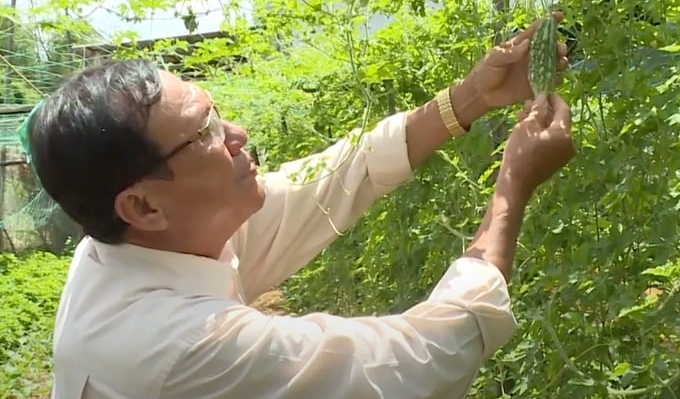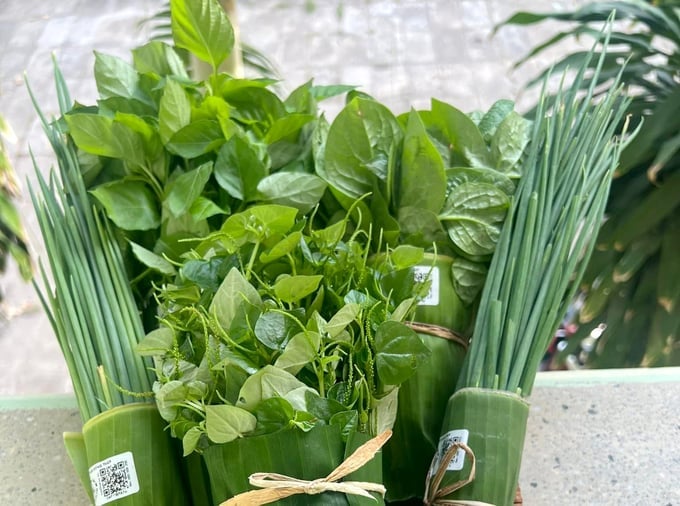June 15, 2025 | 08:03 GMT +7
June 15, 2025 | 08:03 GMT +7
Hotline: 0913.378.918
June 15, 2025 | 08:03 GMT +7
Hotline: 0913.378.918

An organic vegetable garden according to PGS standards in Ben Tre. Photo: Son Trang.
Recalling the story of supporting small-scale farmers in Ben Tre and Dong Thap to produce organic vegetables according to PGS (Participatory Guarantee System) standards, Mrs. Ino Mayu, Chief Representative of Seed to Table in Vietnam shared: "Ten years ago, when we started working as Associate Professors in Ben Tre province, we encountered many difficulties. The main reason is that at that time, only a few farmers knew about organic agriculture, and consumers were still less interested in organic agricultural products. Many people say they still buy vegetables from the market to eat, and they won't die."
Gradually, with the support of Seed to Table and, the agricultural industry, and local government, many farmers in Ben Tre have learned about organic agriculture organic production and participated in growing organic vegetables according to PGS standards.
Farmers who produce organic vegetables according to PGS standards in Ben Tre also automatically propagate organic products to local people. People in the area saw these farmers telling the truth, doing the truth, not spraying, and not using chemicals on vegetables, so they came to buy vegetables to try and find them delicious. Since then, many local people have proactively gone to the gardens of PGS households in Ben Tre to buy organic vegetables in increasing quantities.
The organic agriculture development project implemented by Seed to Table in Dong Thap province has been implemented recently (since 2019), so consumer awareness of organic agriculture and organic products is much better than ten years ago. However, Mrs. Ino Mayu said that without the companionship and coordination of the agricultural sector and local authorities, it would not be as successful as it is today.
To implement the organic agriculture development project well, Dong Thap agricultural industry has coordinated with Seed ta Table to focus on raising awareness of farmers and the community.
According to Mr. Le Quoc Dien, Deputy Director of Dong Thap Department of Agriculture and Rural Development, after establishing organic farming groups according to PGS standards, Dong Thap has built organic vegetable gardens in schools, with 20 schools selected. The construction of organic vegetable gardens in schools, with direct production participation of teachers and students, aims to create an impact from children to each family.
Specifically, after eating organic vegetables at school meals and vegetables produced by their parents when eating at home, children will make comparisons such as "the organic vegetables I grew at school are tastier than the vegetables My parents planted." Thus, through children, it will influence the production and consumption awareness of adults and help them gain knowledge and understanding about organic agriculture and organic agricultural products.
Mrs. Ino Mayu assessed that teaching organic agriculture in schools helps children understand and love organic agriculture and organic products and creates a class of successor farmers. Besides, contributing to raising people's awareness about environmental protection through school organic production activities.

Organic vegetables according to PGS standards of Dong Thap. Photo: Nguyen Thuy.
In 2023 - 2026, in addition to establishing more organic farmer groups according to PGS standards, Dong Thap's agriculture industry will continue to promote the formation of organic vegetable gardens in some schools.
PGS organic certification means a certification that ensures the product is produced according to the process and follows organic production regulations. Our country's certification is built based on the organic agricultural production standards 10TCN 602-2006 issued by the Ministry of Agriculture and Rural Development. This is also the only certification in the domestic market that proves the product is of organic origin.
PGS systems in different countries differ in methods and processes because they adapt to local conditions (communities, geography, politics, and markets). However, across other PGS systems, the basic principles are pretty consistent.
PGS shares a common goal with external certification agencies: to provide a reliable assurance system for consumers looking for organic products. The difference is only in the method: the PGS system encourages or may even require the direct participation of farmers and consumers in the certification process. Direct participation helps PGS programs reduce paperwork and record keeping, which is essential for smallholder farmers in organic production systems to participate and keep certification costs low.
Being granted PGS certification is an opportunity for agricultural products to compete well in the market, ensuring health safety for consumers while contributing to effective economic development.
Translated by Tuan Huy
![Turning wind and rain into action: [4] Bringing climate bulletins to remote and isolated areas](https://t.ex-cdn.com/nongnghiepmoitruong.vn/608w/files/linhnhp/2025/06/14/1152-z6704423696987_15fd32ffc26d590d204d520c9dac6786-nongnghiep-151141.jpg)
(VAN) The Vietnam Agriculture and Nature Newspaper interviewed Mr. Vu Thai Truong, Acting Head of Climate Change and Environment at UNDP Vietnam, to gain deeper insight into how climate bulletins are delivered to farmers.

(VAN) In Tien Giang, a high-tech shrimp farm has developed a distinctive energy-saving farming model that has yielded promising results.
![Turning wind and rain into action: [3] 300.000 farmers benefit from agro-climatic bulletins](https://t.ex-cdn.com/nongnghiepmoitruong.vn/608w/files/news/2025/06/12/e5a48259d6a262fc3bb3-nongnghiep-125122.jpg)
(VAN) The agro-climatic bulletin has become a valuable tool for farmers in the Mekong Delta. After more than five years of implementation, the initiative is gradually being expanded nationwide.
![Turning wind and rain into action: [2] Providing forecasts to the people](https://t.ex-cdn.com/nongnghiepmoitruong.vn/608w/files/news/2025/06/12/e5a48259d6a262fc3bb3-nongnghiep-103927.jpg)
(VAN) In addition to improving the quality of hydrometeorological forecasts, putting forecast bulletins into practical use is crucial for production and disaster prevention.

(VAN) Blue carbon is receiving attention for its rapid absorption capacity and vast potential. It represents a promising nature-based solution to respond to climate change.
/2025/06/11/3507-1-161904_583.jpg)
(VAN) Seagrass beds and coral reefs serve as 'cradles' that nurture life in the ocean depths, creating rich aquatic resources in Vietnamese waters.
![Turning wind and rain into action: [1] Forecasting for farmers](https://t.ex-cdn.com/nongnghiepmoitruong.vn/608w/files/news/2025/06/11/e5a48259d6a262fc3bb3-nongnghiep-111919.jpg)
(VAN) Weather is no longer just a matter of fate. Forecasts have now become an essential companion for farmers in every crop season.